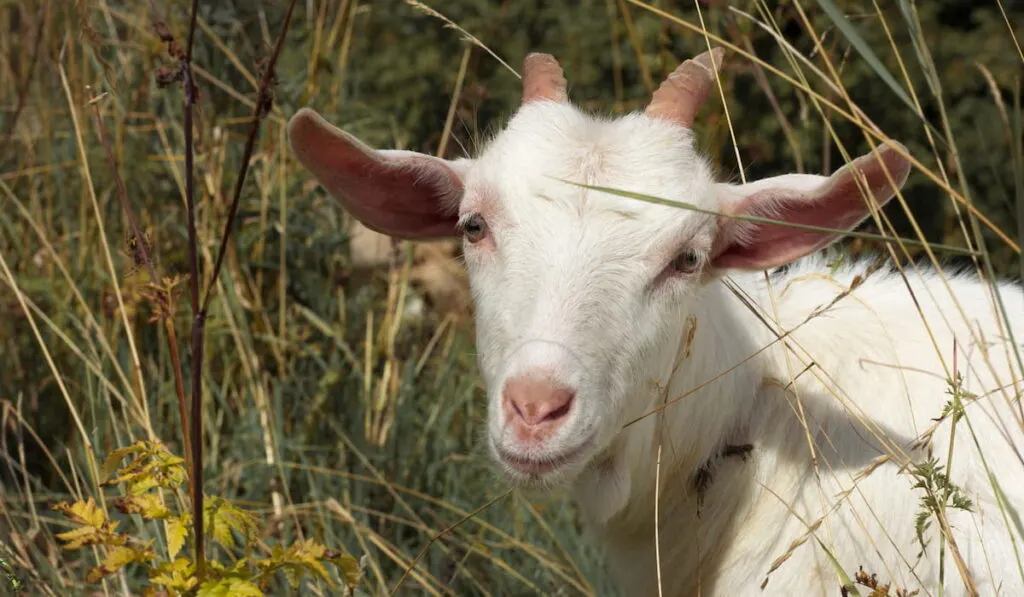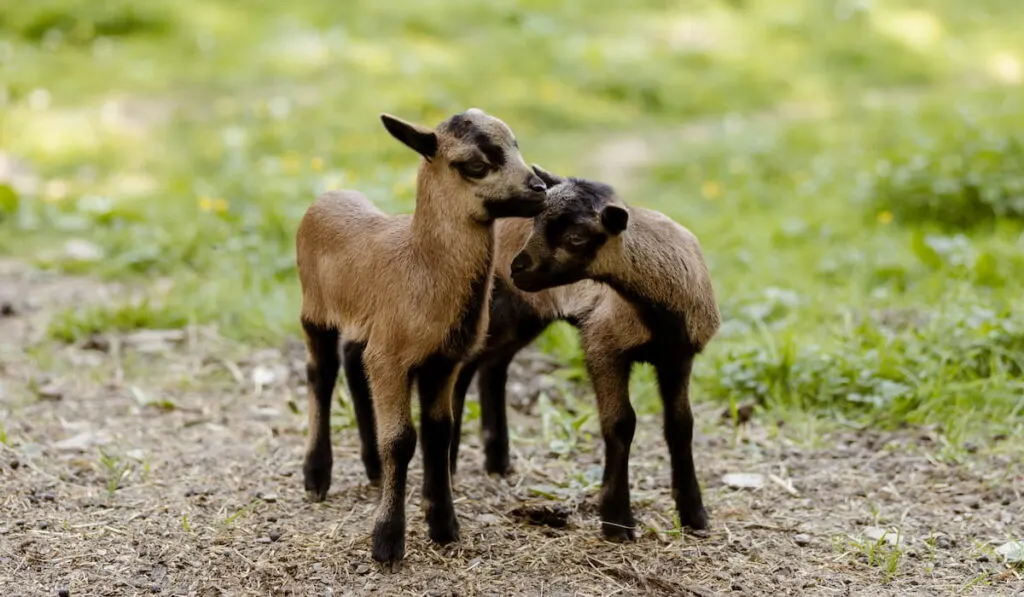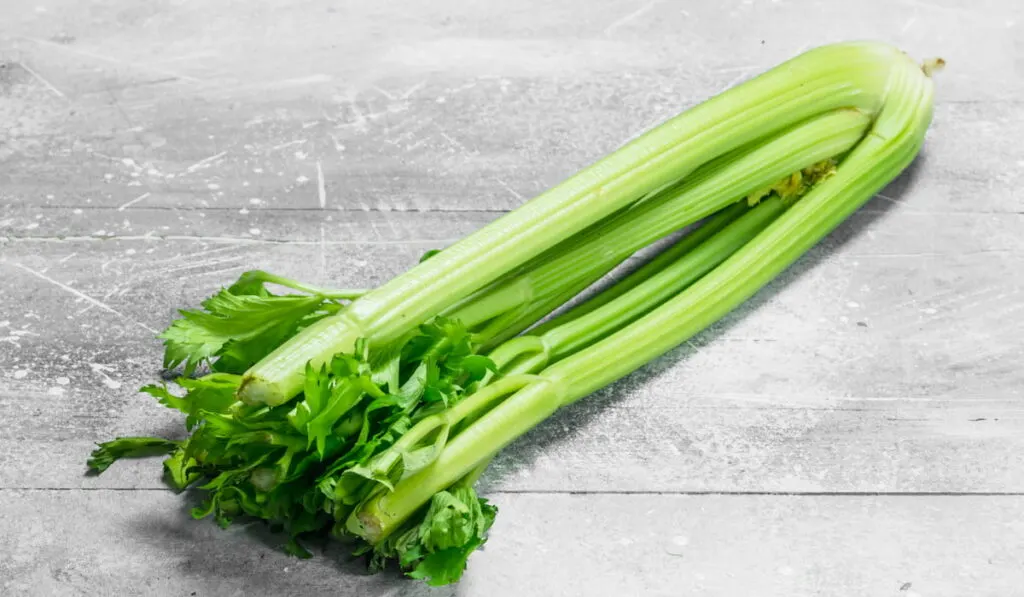A goat can survive on its regular diet of hay, straw, grass, and similar fibrous plant matter but sometimes it’s nice to spice it all up with some treats.
The good news is, there are many treat options to choose from for goats, and one of the many options is celery.
Can goats eat celery? Yes, goats can eat celery.
Celery is a safe, healthy, and nutritious treat to offer goats. Beyond being nutritious, it is enjoyably crunchy, and it has a fresh flavor.

However, like many other goat treats, celery should not replace a regular goat diet and it should be given in moderate amounts.
If you intend to feed celery to your goats, you probably want to know all the ins and outs.
So, we compiled answers to some of the questions you may have about goats and celery.
Can Goats Eat Celery?
Hay, forbs, browse, and grasses typically make up the usual diet of a goat.
They form the most vital part of a complete goat diet. But the said types of plants are not the only ones you can feed goats.
There are other plants goats can eat and while those other plants cannot replace hay, forbs, or browses, they can serve as treats. One of such plants is celery.
Goats can eat celery alone as a treat. You may also combine it with their regular foods as a supplement.
While goats are not particularly picky, the fresh flavor and the crunchiness of celery will be pleasing to them.
Besides, when fed as a supplement, celery offers various nutrients beneficial to the wellbeing of goats.
Although celery is safe in goats, they should only eat it moderately. In large amounts, celery might become toxic to goats due to some of the substances it contains.
Can Baby Goats Eat Celery?
No, baby goats should not be allowed to eat celery. At least, not before they become 2-3 months old.
In their early days, the ruminant system of kid goats is not yet developed. The rumen and reticulum (especially the rumen) do not have what it takes to digest plant matter.
Therefore, they feed only on milk. The milk ingested by kid goats bypasses the rumen, reticulum, and omasum.
It goes through the esophageal groove to the abomasum. Then in the abomasum, it is digested. At this stage, they are called pre-ruminants.
Giving them celery or any other plant matter when they are pre-ruminants will upset their stomach. It may also make them weak.
But after about 2-3 months, the ruminant system should be well-developed. At this point, they can eat celery.

Dangers of Eating Too Much Celery
One of the vital considerations when offering celery to your goats is quantity.
Do not let your goat eat too much celery, or they may suffer.
For one, celery does not replace their regular diet. So, if goats consume too much celery, they may be unable to eat their usual meals.
Besides the above, celery contains a group of substances called furocoumarins.
In moderate amounts, the furocoumarins in celery will do no harm to goats. But when they consume too much celery, they become harmful.
The two furocoumarins found in celery are xanthotoxin and bergapten.
In large amounts, these substances trigger phototoxicity in goats, which can be fatal. Generally, phototoxicity makes the skin of the goats more sensitive to UV lights.
Thus, they may suffer blisters when their skin is exposed to the sun.
Benefits of Celery to Goats
About 95% of celery is made up of water. So, on a hot day, celery can contribute to helping goats to cool off.
Besides that, celery contains vitamins B1, B2, B3, B5, B6, and B9. These B-vitamins all contribute to various physiological processes in the body.
They help with nerve function and promote metabolism. B-vitamins also help improve enzyme function, muscle function, heart health, skin structure, and hormonal function.
Celery also contains vitamin A, which helps with skin and visual development in goats.
Then there is vitamin E, which is an antioxidant. Vitamin E helps fight oxidative stress in goats. When deficient, goats may suffer from white muscle disease, a disease of the heart and skeletal muscles.
Celery also offers potassium, magnesium, calcium, and phosphorus to goats.
All 4 of these minerals play a role in the electrolyte-fluid balance in the body of goats. Potassium and calcium are vital to nerve and muscle function.
Magnesium acts as a cofactor to many enzymes, so it promotes metabolism.
Also, calcium and phosphorus are vital to the health of the bones of a goat and calcium is essential for proper lactation in goats.
About 1.6% of celery is dietary fiber. Although goats already get fiber from their regular diet, the fiber in celery can be supplemental.

Can Goats Drink Celery Juice?
Celery juice is more concentrated than celery.
The amount of furocoumarins per unit volume of celery juice is higher than the amount per unit weight of celery. So, it can get toxic faster than when your goats eat celery.
For this reason, avoid giving goats celery juice.
Can Goats Eat Celery Sticks?
Goats can eat both the sticks and the leaves of celery.
Their ruminant stomachs are designed to handle such toughness. So, it’s safe to let them have celery sticks when you feed them celery.
In fact, prioritize giving them the celery sticks.
Final Thoughts
As long as it is given in moderation, goats can eat celery safely.
Adult goats will have no issues with moderate intake of celery.
However, kid goats should avoid it totally when they are still pre-ruminant.
Both adult and kid goats should avoid drinking celery juice since it is more likely to lead to toxicity.
